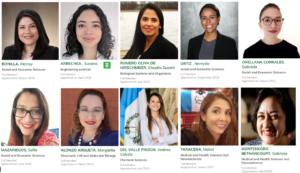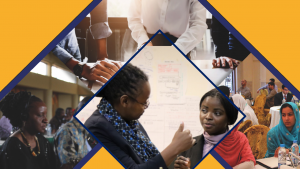
Whose knowledge counts? Why citizen evidence can lead to better policy making
In an article originally published on the Think Tank Initiative blog, Peter Taylor, Director of Strategic Development at IDRC, and former Associate Director for the Think Tank Initiative, and INASP’s Emily Hayter, discuss the role of citizen evidence in improving policy decisions.
In an era of fake news and widening distrust in public institutions, the role of evidence in public policy and decision making is increasingly being questioned. Many citizens throughout the world believe their voices are not being heard on issues that they feel strongly about and feel increasingly marginalised from public policy processes. It seems ironic that in an era when advances in technology have increased our collective capacity to communicate ideas and share information ever faster and more efficiently, that so many citizens feel disempowered, and disconnected from the decision-making processes that ultimately shape their lives.
A growing community of actors (researchers, evaluators, sympathetic policy makers) are keen to address these challenges by promoting citizen engagement in the generation, uptake and use of evidence for public policy making. This can mean citizens actively contributing their own lived experience as evidence, for instance via individual testimonies, as well as through mechanisms like social audits and citizen dialogues.
We have participated recently in several conversations about this, including at the “African Evidence Informed Policy Forum” in Nairobi in March 2018.We began discussing the issue with other participants, and it challenged us to think about ways to engage with others who might also be interested – and who are also actively working to promote the generation and use of citizen evidence. Since then we’ve seen the thread of conversation woven into several other events including “Evidence 2018” in Pretoria, and the Think Tank Initiative Exchange (TTIX) in Bangkok.
Recognizing power dynamics
Promoting citizen evidence as a key piece of the public policy making puzzle is not a new issue. There is a long thread of effort, experience and learning exploring the potent power dynamics of the international development sector, and the politics of whose voices get heard and why. There isstill a tendency for policy actors and decision makers to go to the same narrow group of sources for evidence, even when citizens themselves often have the deepest knowledge of how policies are actually implemented, whether it is delivery of health care services, or access to quality, lifelong education. Understanding citizen evidence offers a route to grapple with, and maybe respond to, some fundamental questions about power and equity, the evidence regarding whose lives are affected by the ways in which policies are designed and implemented, and the reality of whose voices count when it comes to understanding what happens on the ground.
As interest in evidence informed policy making (EIPM) continues to grow, being more intentional about understandings of power, and practices to address power imbalances, may offer important ways to address some of the inequities currently experienced in whose voices are heard, and whose knowledge counts.
How does the concept of ‘citizen evidence’ help us build the EIPM field?
Getting to grips with citizen evidence offers huge potential to build the evidence-informed policy making field. Considering how to strengthen citizen engagement in policy making through evidence processes brings us closer to questions of democratic accountability and effective institutions (what Parkhurst has called ‘the good governance of evidence’). It also reminds us of the moral case for evidence by pushing us towards questions of social justice and inclusion. During our conversations, the examples and experiences shared by our colleagues show that the growth and embedding of democratisation in Africa creates more spaces for citizens to engage in processes where evidence plays an important role. But while new spaces for citizens to contribute their evidence open up, so do new challenges. Making sure that the processes of gathering this evidence are themselves inclusive and sustainable is vital. We’ve heard a lot about how approaches to systematically gathering and responding to citizen evidence can be “institutionalised”, and how organizations, networks and coalitions of interested actors are increasingly working together to help facilitate the gathering of evidence, and ensuring that it becomes part of the currency of policy and decision making.
Learning from experience
Often discussions around power and policy remain at an academic and abstract level, but there are many exciting examples of practical approaches in Africa which we’ve heard about recently:
- The use of citizen report cards by Advocates Coalition for Development and Environment (ACODE) to assess the level of performance for delivery of local government services in Uganda
- Facilitation of citizen dialogues around a diverse range of national public policy issues by The Economic and Social Research Foundation (ESRF) Tanzania
- Restless Development’s action research work with the ‘youth think tank’ project in Uganda
- Africa’s Voices innovative work using radio for social research in Kenya and Somalia
- Work of Abdul Latif Jameel Poverty Action Lab (JPAL) on participation in elections in Sierra Leone, evaluating the effect of publicly screened debates in the run-up to parliamentary election
- Canon Collins Trust as a unique convening space for researchers and activists in southern Africa
A note of caution
We are seeing a “groundswell of agency” involving many different actors and approaches to citizen evidence, but we also need to be careful not to reinvent the wheel. We recognize our collective need to learn and build something greater than the sum of our parts. How can we support and nourish growing communities of practice around evidence informed policy making which can in turn help grow an emerging field? We recognise the conversations we’re having are involving only a very few individuals at any given moment, but there seems to be a real sense of need, relevance and excitement generated. How can we be as inclusive as possible in the way we have this conversation?
We want to hear from you
We know that there are many individuals, and organizations, interested in being part of this conversation going forward. We invite engagement and ideas from others on how best to widen a dialogue on this that can be intentional, inclusive and engaged.

 Previous Post
Previous Post Next Post
Next Post


